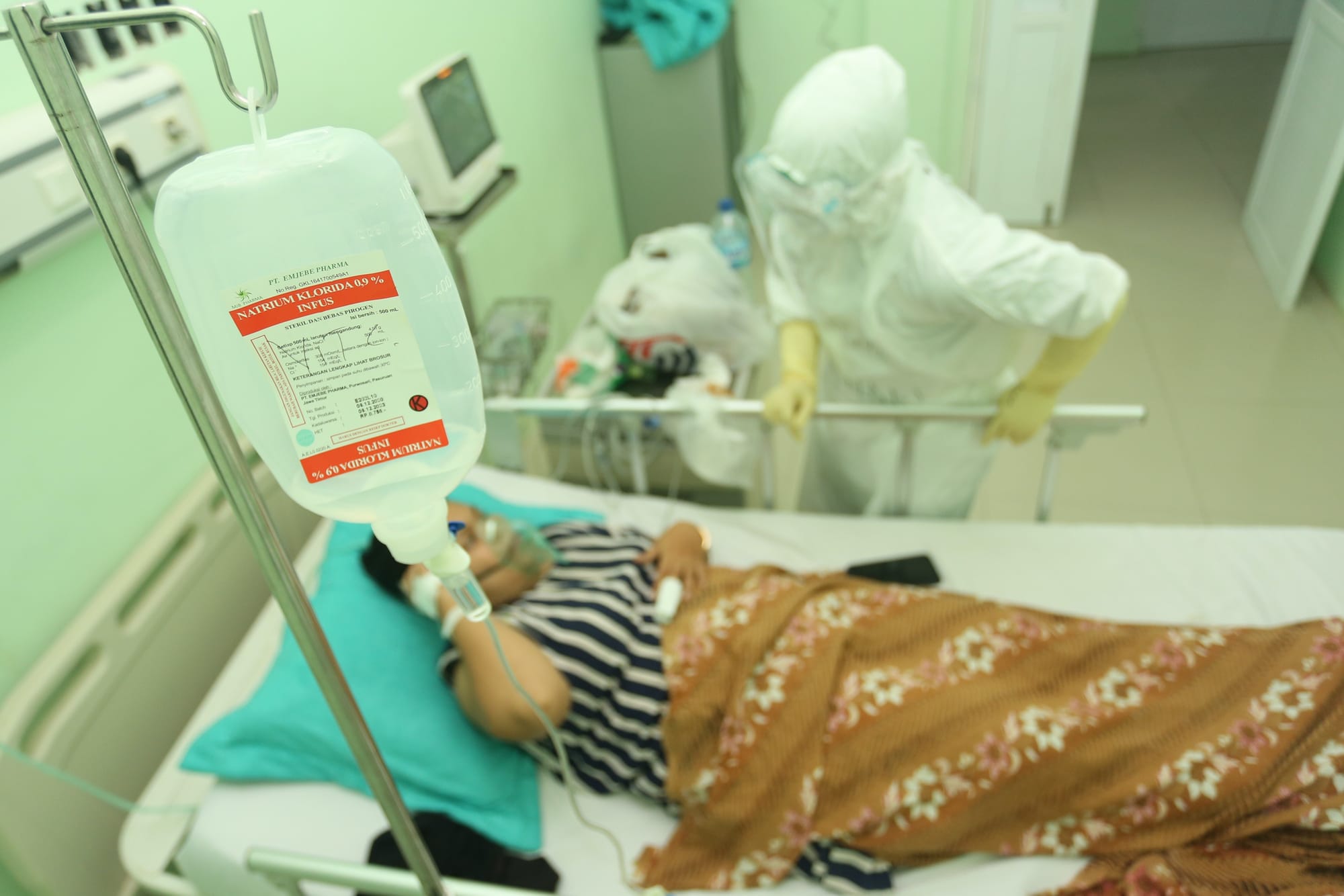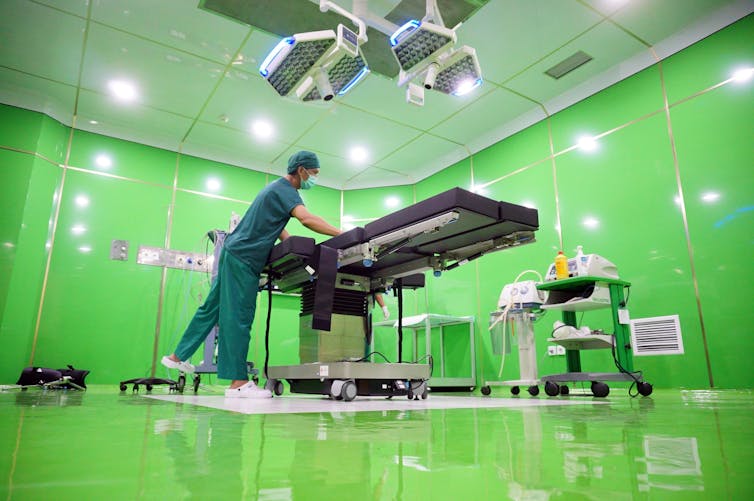
The spread of COVID-19 has had a significant impact on healthcare systems in the world’s fourth-most-populous country, Indonesia.
The demand for medical devices, surgical supplies and drugs has presented many challenges, resulting in supply shortages both for hospitals and local distributors.
These shortages have led to many COVID-19 patients not being treated in time.
Indonesia has reported the highest number of COVID-19 cases in Southeast Asia. In this region, Indonesia is also among the countries with the most deaths due to COVID-19 infections.
Our latest research suggests Indonesia should partner with developed nations, such as Australia, to build resilient and responsive healthcare supply chains involving modern digital technologies.
An Australia-Indonesia partnership
From a geographical perspective, Australia and Indonesia have much in common.
Both countries have their population spread over a wide area. This presents unique challenges for logistics and warehouse arrangements, especially when critical supplies need to be kept cold.
Bringing together practitioners, policymakers and academic researchers from Indonesia and Australia, our research shows how the former could learn from the latter about modern supply chain strategies for healthcare procurement.
Australia’s healthcare system is among the most well-organised and well-regulated in the world.
Among the highly developed nations (including the US, the UK, Germany, the Netherlands, Canada, and New Zealand), Australia’s healthcare sector has performed exceptionally well based on measures of quality of care, access, efficiency, and equity.
The high quality of Australia’s healthcare system has been proven during the pandemic. Its response to the pandemic has been highly effective. This is the result of strong leadership, and various measures to ensure medical supplies and personal protective equipment are available.
As of early June 2021, Australia has recorded 30,195 cases and 910 deaths from COVID-19. Australia has fared much better than most other developed nations. The UK has recorded more than four million cases and more than 120,000 deaths. Canada has had more than 1.3 million cases, with close to 25,000 deaths.
Our research shows what’s happening in Indonesia is the opposite of Australia’s experience.
Our interviews with stakeholders in Indonesia indicated that procurement and supply chain management in the healthcare sector remains at a developing stage, even since the pandemic began. For example, many procurement activities don’t make use of advanced information and communication systems, both internally within hospitals, and externally with wholesales and suppliers. This causes delays in deliveries.

Our study employed a qualitative method involving two phases.
First, we conducted in-depth, semi-structured interviews with seven senior procurement personnel working in the healthcare sector in Indonesia, and a senior policymaker working in the Bandung City Health Office in West Java province.
Second, we held two focus group sessions with stakeholders (senior procurement professionals, advisers to governments and industry consultants) from Indonesia and Australia. These discussions covered technological advances in healthcare and health supply chains, knowledge mobilisation, implementation, and change management.
We completed data collection and analysis in the second half of 2020.
When the pandemic hit Indonesia, its sub-par healthcare procurement and supply chain management were slow to improve. This contributed to the challenges hospitals have faced, with their supply chains leaving them unable to respond in a timely and effective manner to COVID-19.
Our study looked at how Indonesia can improve its healthcare supply chains by learning from more developed economies, in this case Australia.
We recommend establishing a network of healthcare supply chain professionals and academics from Australia and Indonesia. This network will enable them to share knowledge via regular workshops, presentations and dialogues.
In addition to the knowledge transfer, this partnership will help build supply chain capabilities in the Indonesian healthcare sector. We can start with pilot projects, which can then be showcased to the wider healthcare system.
Partnership in digital revolution
Scholars and practitioners in developed nations have called for an immediate digital revolution to boost healthcare systems.
Advancing digitalisation can enhance supply chain integration, and add significant value to the healthcare supply chain by improving service and financial performance.
The most common examples of this are data synchronisation, and establishing standards for electronic data sharing. This will reduce errors, increase inventory accuracy, and improve the flow of materials and products.
Australia is well-advanced in using advanced technologies for managing logistics and warehousing, moving towards smart or digital supply chains.
The Australian government announced a A$55 million Digital Health Cooperative Research Centre (DHCRC), involving a large number of academics, research institutions and businesses, in April 2018.
Meanwhile, as our research highlights, Indonesia has been slow in adopting digital healthcare systems. It’s due to a number of challenges associated with funding, digital infrastructure and expertise, not to mention the leadership needed at all levels to achieve the required changes.
Discussions with our respondents highlighted the value of future collaboration between Australia and Indonesia to share knowledge of best procurement practices and supply chain digitalisation.
The partnership can facilitate Indonesia’s progress in supply chain digitalisation and best practice in healthcare procurement.
Knowledge sharing must be carefully managed
Indonesian supply chain professionals believe technology development and knowledge-sharing must be managed carefully to suit Indonesia’s current level of knowledge, experience and infrastructure.
We found that learning from the experience of others is one of the most critical success factors in undertaking large-scale projects. Learning from the Australian experience can be highly valuable to Indonesian healthcare supply chain professionals as they start their journey to digitalise procurement processes and supply chains.
Our research also recommends establishing the Australia-Indonesia Healthcare Improvement Network as a platform to advance this transformation.
Key stakeholders who can make a significant contribution are academics, researchers and supply chain practitioners, from the director level down to staff working in the warehouses and stores, as well as policymakers.
Similar initiatives in other countries have delivered many benefits. One example is a recently completed program funded by the Canadian government to improve supply chain processes in the healthcare sector by using digitalisation.
This article was coauthored by Dr Wawan Dhewanto and Dr Mursyid Hasan Basri, from Bandung Institute of Technology.
Those interested in being part of the proposed Australia-Indonesia Healthcare Improvement Network can contact Professor Amrik Sohal (amrik.sohal@monash.edu) and Professor Daniel Prajogo (daniel.prajogo@monash.edu) at Monash University, or Dr Wawan Dhewanto (email:w_dhewanto@sbm-itb.ac.id) and Dr Mursyid Hasan Basri (mursyid@sbm-itb.ac.id) at ITB.
This research was funded by the Australian government through the Australia-Indonesia Centre under the PAIR program.
This article was co-authored with Mursyid Hasan Basri and Wawan Dhewanto from Bandung Institute of Technology, Indonesia, and Helen Brown and Marlene Millott, who work for the The Australia-Indonesia Centre. It originally appeared in The Conversation.





